13 nov 2016

Israeli Prime Minister Benjamin Netanyahu said Sunday he supports a bill to bar the Muslim call to prayer via mosque loudspeakers.
Speaking ahead of a vote on the bill in the Ministerial Committee for Legislation, the prime minister said that the blared prayer calls are a public nuisance that cuts across all religious denominations.
“The Muslims, the Jews, and the Christian are all suffering from this,” he claimed. “I can’t tell you how many times people have approached me, from all walks of Israeli society, who are crying out about the suffering that is caused by excessive noise reaching them from prayer house announcements.”
The prayer calls, traditionally announced through minarets five times, have been a frequent target of Israeli ire, with many claiming they are a loud nuisance that echoes in Jewish towns and neighborhoods.
The bill was penned by Jewish Home MK Moti Yogev. Supporters of the bill say freedom of religion should take a backseat to quality of life in this case.
Arab lawmakers attacked the proposal as a hate-fueled assault on Muslim freedom of religion.
Joint (Arab) List leader MK Aymen Odeh slammed the legislation, calling it “another bill, in a series of populist bills, whose objective is to create an atmosphere of hate and incitement against the Arab population.”
“It’s clear that the sole purpose of the bill is to mark the mosques as a problem source. It is a clear attack on Muslim freedom of religion and the continuation of a wave of persecution that the prime minister is leading,” added Odeh.
His fellow party lawmaker Hanin Zoabi suggested that those who are bothered by the calls to prayer should find somewhere else to live.
“Those who suffer from the sounds of the muezzins are specifically those who chose to settle near the mosques, and… they are invited to leave if they are suffering so much,” she said.
“This isn’t Europe here. Anyone who feels like he is in Europe, and thinks this is Europe, should consider going there,” added Zoabi.
Likud MKs Miki Zohar and Nurit Koren, Jewish Home MKs Bezalel Smotrich and Shuli Muallem-Refaeli, and Kulanu MK Merav Ben-Ari have also endorsed the legislation.
“Hundreds of thousands of Israeli citizens — in the Galilee, Negev, Jerusalem, Tel Aviv-Jaffa and other places in central Israel — suffer regularly and daily from the noise caused by the call of the muezzin from mosques,” reads the proposed legislation.
Speaking with the PIC, Preacher of the holy al-Aqsa Mosque, Sheikh Akrema Sabri, said the Israeli bid to ban the call to prayers is a proof that Israeli fanatics are manipulating the law to suppress Muslims’ religious freedom and step up aggressions.
He added that the call to prayers has occurred in Palestine for 15 centuries, urging the Islamic states to take up their responsibilities as regards such Israeli violations of Muslims’ religious freedom.
Speaking ahead of a vote on the bill in the Ministerial Committee for Legislation, the prime minister said that the blared prayer calls are a public nuisance that cuts across all religious denominations.
“The Muslims, the Jews, and the Christian are all suffering from this,” he claimed. “I can’t tell you how many times people have approached me, from all walks of Israeli society, who are crying out about the suffering that is caused by excessive noise reaching them from prayer house announcements.”
The prayer calls, traditionally announced through minarets five times, have been a frequent target of Israeli ire, with many claiming they are a loud nuisance that echoes in Jewish towns and neighborhoods.
The bill was penned by Jewish Home MK Moti Yogev. Supporters of the bill say freedom of religion should take a backseat to quality of life in this case.
Arab lawmakers attacked the proposal as a hate-fueled assault on Muslim freedom of religion.
Joint (Arab) List leader MK Aymen Odeh slammed the legislation, calling it “another bill, in a series of populist bills, whose objective is to create an atmosphere of hate and incitement against the Arab population.”
“It’s clear that the sole purpose of the bill is to mark the mosques as a problem source. It is a clear attack on Muslim freedom of religion and the continuation of a wave of persecution that the prime minister is leading,” added Odeh.
His fellow party lawmaker Hanin Zoabi suggested that those who are bothered by the calls to prayer should find somewhere else to live.
“Those who suffer from the sounds of the muezzins are specifically those who chose to settle near the mosques, and… they are invited to leave if they are suffering so much,” she said.
“This isn’t Europe here. Anyone who feels like he is in Europe, and thinks this is Europe, should consider going there,” added Zoabi.
Likud MKs Miki Zohar and Nurit Koren, Jewish Home MKs Bezalel Smotrich and Shuli Muallem-Refaeli, and Kulanu MK Merav Ben-Ari have also endorsed the legislation.
“Hundreds of thousands of Israeli citizens — in the Galilee, Negev, Jerusalem, Tel Aviv-Jaffa and other places in central Israel — suffer regularly and daily from the noise caused by the call of the muezzin from mosques,” reads the proposed legislation.
Speaking with the PIC, Preacher of the holy al-Aqsa Mosque, Sheikh Akrema Sabri, said the Israeli bid to ban the call to prayers is a proof that Israeli fanatics are manipulating the law to suppress Muslims’ religious freedom and step up aggressions.
He added that the call to prayers has occurred in Palestine for 15 centuries, urging the Islamic states to take up their responsibilities as regards such Israeli violations of Muslims’ religious freedom.
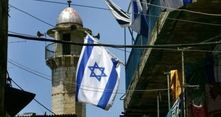
The Knesset ministerial committee on legislation is due to discuss a bill calling for banning the use of loudspeakers to recite the daily mosque adhan (call to prayer) in Arab neighborhoods, where Jews also live.
Habayit Hayehudi MK Moti Yogev and other right-wing lawmakers claim in their bill that the Adhan through loudspeakers produces noise pollution, disturbs Jewish citizens and affects the quality of life, which they said is more important than freedom of religion.
“Hundreds of thousands of Israelis in the Galilee, the Negev, Jerusalem, Tel Aviv-Jaffa and other areas in the center of the country experience regular daily suffering from the noise resulting from the muezzin calls in the mosques,” their bill say.
"The bill presents a worldview by which freedom of religion should not constitute a factor damaging quality of life, and proposes prohibiting houses of prayer from using loudspeakers to call worshippers or to broadcast religious and nationalistic statements and sometimes incitement," Yogev wrote in the new bill, according to Haaretz newspaper.
The bill, which needs to be first approved by the ministerial committee before it is tabled for vote before the Knesset, would give the Israeli police the right to detain and interrogate Palestinian muezzins ( people who recite prayer calls), take legal measures against them and impose financial penalties on them.
This is not the first time such a proposal has been tabled. In late 2014, right-wing Yisrael Beiteinu MK Robert Ilatov proposed a similar ban, but it failed to win the support needed to pass various Knesset readings and be voted into law.
Habayit Hayehudi MK Moti Yogev and other right-wing lawmakers claim in their bill that the Adhan through loudspeakers produces noise pollution, disturbs Jewish citizens and affects the quality of life, which they said is more important than freedom of religion.
“Hundreds of thousands of Israelis in the Galilee, the Negev, Jerusalem, Tel Aviv-Jaffa and other areas in the center of the country experience regular daily suffering from the noise resulting from the muezzin calls in the mosques,” their bill say.
"The bill presents a worldview by which freedom of religion should not constitute a factor damaging quality of life, and proposes prohibiting houses of prayer from using loudspeakers to call worshippers or to broadcast religious and nationalistic statements and sometimes incitement," Yogev wrote in the new bill, according to Haaretz newspaper.
The bill, which needs to be first approved by the ministerial committee before it is tabled for vote before the Knesset, would give the Israeli police the right to detain and interrogate Palestinian muezzins ( people who recite prayer calls), take legal measures against them and impose financial penalties on them.
This is not the first time such a proposal has been tabled. In late 2014, right-wing Yisrael Beiteinu MK Robert Ilatov proposed a similar ban, but it failed to win the support needed to pass various Knesset readings and be voted into law.
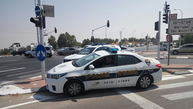
After being beaten by Jewish youths in a nationalistically motivated attack, Palestinian taxi driver to receive status of 'victim of enemy hostilities' by national health insurance; now eligible for more state benefits.
Ishaq abu-Jibne -a Palestinian taxi driver who was attacked by Jews in downtown Jerusalem – has been recognized by the police as “the victim of enemy hostilities.”
The incident happened in August when five Jewish youths approached the taxi driver, and yelled “this is our country – go work in Gaza.”
As abu-Jibne began trying to back away from them, the youths pulled out mace and sprayed him, threw rocks at him, then beat him.
Although the police did arrive on the scene and order the Palestinian taxi driver an ambulance, they never went to the hospital to receive a statement from him. Abu-Jibne has to go to the police station himself to file a complaint, but by that time the security camera footage had already been erased.
His case was closed due to lack of evidence.
Because his file was closed, he wasn’t able to be recognized by the national health insurance as a victim of enemy hostilities – a designation which would have made him eligible for a variety of state benefits.
After abu-Jibne’s case was published in Yediot Ahronot, the case was reopened, and the police ruled that the injuries abu-Jibne sustained were in fact the result of a nationalistic attack, and is now on the way to being recognized by the national health insurance as a “victim of enemy hostilities.”
Ishaq abu-Jibne -a Palestinian taxi driver who was attacked by Jews in downtown Jerusalem – has been recognized by the police as “the victim of enemy hostilities.”
The incident happened in August when five Jewish youths approached the taxi driver, and yelled “this is our country – go work in Gaza.”
As abu-Jibne began trying to back away from them, the youths pulled out mace and sprayed him, threw rocks at him, then beat him.
Although the police did arrive on the scene and order the Palestinian taxi driver an ambulance, they never went to the hospital to receive a statement from him. Abu-Jibne has to go to the police station himself to file a complaint, but by that time the security camera footage had already been erased.
His case was closed due to lack of evidence.
Because his file was closed, he wasn’t able to be recognized by the national health insurance as a victim of enemy hostilities – a designation which would have made him eligible for a variety of state benefits.
After abu-Jibne’s case was published in Yediot Ahronot, the case was reopened, and the police ruled that the injuries abu-Jibne sustained were in fact the result of a nationalistic attack, and is now on the way to being recognized by the national health insurance as a “victim of enemy hostilities.”
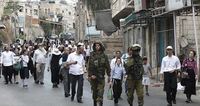
Israeli fanatic settlers overnight Saturday stormed an archaeological site in al-Khalil and performed Talmudic rituals.
A PIC news reporter said dozens of Israeli fanatics, escorted by the occupation army, stormed Beer Haram al-Rama, in al-Khalil city, and scoured the area, performing provocative rituals all the way through the assault.
Beer Haram al-Rama is an ancient Palestinian site in al-Khalil province. Excavations carried out in the area proved that the site dates back to the era of Prophet Abraham (Peace Be upon Him).
Israeli fanatics have often defiled Palestinians’ historical sites and Islamic shrines in the occupied Palestinian territories under the pretext that they are of a Jewish origin.
Such assaults make part of preplanned Israeli Judaization schemes aiming to wipe out the Palestinian identity of Islamic and Christian holy sites in the area.
A PIC news reporter said dozens of Israeli fanatics, escorted by the occupation army, stormed Beer Haram al-Rama, in al-Khalil city, and scoured the area, performing provocative rituals all the way through the assault.
Beer Haram al-Rama is an ancient Palestinian site in al-Khalil province. Excavations carried out in the area proved that the site dates back to the era of Prophet Abraham (Peace Be upon Him).
Israeli fanatics have often defiled Palestinians’ historical sites and Islamic shrines in the occupied Palestinian territories under the pretext that they are of a Jewish origin.
Such assaults make part of preplanned Israeli Judaization schemes aiming to wipe out the Palestinian identity of Islamic and Christian holy sites in the area.
11 nov 2016
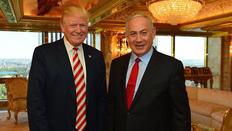
Top Israel affairs advisor to President-elect Donald Trump tells Israel's Army Radio that the his boss doesn't share the long-held US stance that Israeli settlements should be condemned or they pose an 'obstacle to peace.'
A top adviser to President-elect Donald Trump says his boss doesn't think Israeli settlements should be condemned and they don't pose an "obstacle to peace."
Jason Greenblatt's comments to Israel's Army Radio Thursday would mark a stark departure from the long-time American stance that Israeli construction in areas captured in the 1967 Six Day War makes it more difficult to reach a peace agreement with the Palestinians.
Greenblatt is the chief legal officer and executive vice president at the Trump Organization. He has been tapped by Trump as his top adviser on Israel.
Israel and the US are close allies but relations were often tense between President Barack Obama and Prime Minister Benjamin Netanyahu, mainly over Israel's policies toward the Palestinians. Netanyahu and Trump have been friends for many years and ties between the two are expected to improve.
After Trump was proclaimed the victor of the presidential elections, Netanyahu posted a Facebook video congratulating the president-elect, describing him as a "true friend" and expressed his optimism about elevating the US-Israeli relationship to "new heights." Later on Netanyahu called Trump, reiterated his belief that he was a "true friend of Israel" and assured him that the US has no greater ally than Israel.
Settler leadership happy with Trump victory
Meanwhile, Trump's victory has put a new, optimistic wind in the sails of the settlement enterprise in Israel, as right wing MKs and West Bank regional council leaders welcomed the Republican's election.
Yossi Dagan, head of the Shomron Regional Council, publicly supported Trump, and expressed his hope that a new path will be made in regards to the West Bank settlements.
"I'm sorry to say this, but the decision to build a new park in the West Bank isn't made by the head of the Regional Council nor by the Israeli government, but on the whims of the President of the United States and how he feels that day," Dagan said.
Dagan, who participated in the opening of the Trump campaign headquarters in the West Bank, and even met with Trump Advisor David Friedman, continued by saying that "we decided that we will no longer sit on the side and watch as world leaders decide our lives, but become involved instead – both for our sakes, and for the sake of our children." Dagan said.
"Trump's announcements were clearly in favor of strengthening Jewish settlement in the West Bank. We regularly host parliamentarians, congressmen, and senators, and have created extensive relationships with high ranking Republican officials," he continued
Dagan then directed his message to the Netanyahu government, saying "we have high expectations for a significant change in how the Israeli government treats Judea and Samaria following the election of a US president who is a friend to the settler movement in the West Bank. We expect an end to the construction freeze, and even more."
Mayor of Ariel Eliyahu Shaviro also welcomed Trump's victory. The mayor added that he believes that the new American president will stand by his pledge of preventing a Palestinian state, and will continue to support building within the settlements, especially in Ariel.
Meanwhile, Acting Head of the Gush Etzion Regional Council Moshe Saville said "I'm sure that a new era of bravery and connection to the land has begun."
The settlers also received support from the Bayit Yehudi party, specifically from Party Chairman Naftali Bennett. He wrote on Facebook that "Trump's victory is a rare opportunity for Israel to announce on its withdrawal from the idea of establishing (a Palestinian state) in the heart of Israeli territory, something which would constitute a direct harm to our security and in the justice of our cause. This is the President elect's view as is written in his platform, and this of course must also be what we do as well. Straight, simple, and clear. This is the end of the era of the Palestinian state."
Meanwhile, Bezalel Smotrich (Bayit Yehudi) said "something happened, the change which occurred (on Tuesday) in the US is a fait accompli. One thing must be made clear, the two state solution must be shelved immediately. The government in the US is going to change, and with that so will the terrible freeze on building which was forced on the State of Israel by the previous administration… I call on the prime minister and the entire government to stand behind the settlement of Judea and Samaria, and to announce the building of thousands of housing units today."
Science Minister Ofir Akunis told Army Radio Thursday that, "We need to think how we move forward now when the administration in Washington, the Trump administration and his advisers, are saying that there is no place for a Palestinian state."
A top adviser to President-elect Donald Trump says his boss doesn't think Israeli settlements should be condemned and they don't pose an "obstacle to peace."
Jason Greenblatt's comments to Israel's Army Radio Thursday would mark a stark departure from the long-time American stance that Israeli construction in areas captured in the 1967 Six Day War makes it more difficult to reach a peace agreement with the Palestinians.
Greenblatt is the chief legal officer and executive vice president at the Trump Organization. He has been tapped by Trump as his top adviser on Israel.
Israel and the US are close allies but relations were often tense between President Barack Obama and Prime Minister Benjamin Netanyahu, mainly over Israel's policies toward the Palestinians. Netanyahu and Trump have been friends for many years and ties between the two are expected to improve.
After Trump was proclaimed the victor of the presidential elections, Netanyahu posted a Facebook video congratulating the president-elect, describing him as a "true friend" and expressed his optimism about elevating the US-Israeli relationship to "new heights." Later on Netanyahu called Trump, reiterated his belief that he was a "true friend of Israel" and assured him that the US has no greater ally than Israel.
Settler leadership happy with Trump victory
Meanwhile, Trump's victory has put a new, optimistic wind in the sails of the settlement enterprise in Israel, as right wing MKs and West Bank regional council leaders welcomed the Republican's election.
Yossi Dagan, head of the Shomron Regional Council, publicly supported Trump, and expressed his hope that a new path will be made in regards to the West Bank settlements.
"I'm sorry to say this, but the decision to build a new park in the West Bank isn't made by the head of the Regional Council nor by the Israeli government, but on the whims of the President of the United States and how he feels that day," Dagan said.
Dagan, who participated in the opening of the Trump campaign headquarters in the West Bank, and even met with Trump Advisor David Friedman, continued by saying that "we decided that we will no longer sit on the side and watch as world leaders decide our lives, but become involved instead – both for our sakes, and for the sake of our children." Dagan said.
"Trump's announcements were clearly in favor of strengthening Jewish settlement in the West Bank. We regularly host parliamentarians, congressmen, and senators, and have created extensive relationships with high ranking Republican officials," he continued
Dagan then directed his message to the Netanyahu government, saying "we have high expectations for a significant change in how the Israeli government treats Judea and Samaria following the election of a US president who is a friend to the settler movement in the West Bank. We expect an end to the construction freeze, and even more."
Mayor of Ariel Eliyahu Shaviro also welcomed Trump's victory. The mayor added that he believes that the new American president will stand by his pledge of preventing a Palestinian state, and will continue to support building within the settlements, especially in Ariel.
Meanwhile, Acting Head of the Gush Etzion Regional Council Moshe Saville said "I'm sure that a new era of bravery and connection to the land has begun."
The settlers also received support from the Bayit Yehudi party, specifically from Party Chairman Naftali Bennett. He wrote on Facebook that "Trump's victory is a rare opportunity for Israel to announce on its withdrawal from the idea of establishing (a Palestinian state) in the heart of Israeli territory, something which would constitute a direct harm to our security and in the justice of our cause. This is the President elect's view as is written in his platform, and this of course must also be what we do as well. Straight, simple, and clear. This is the end of the era of the Palestinian state."
Meanwhile, Bezalel Smotrich (Bayit Yehudi) said "something happened, the change which occurred (on Tuesday) in the US is a fait accompli. One thing must be made clear, the two state solution must be shelved immediately. The government in the US is going to change, and with that so will the terrible freeze on building which was forced on the State of Israel by the previous administration… I call on the prime minister and the entire government to stand behind the settlement of Judea and Samaria, and to announce the building of thousands of housing units today."
Science Minister Ofir Akunis told Army Radio Thursday that, "We need to think how we move forward now when the administration in Washington, the Trump administration and his advisers, are saying that there is no place for a Palestinian state."
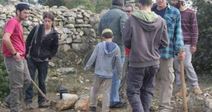
A group of Israeli settlers stormed Friday a number of towns and villages east of Jenin under the protection of Israeli Occupation Forces (IOF).
Local sources affirmed that dozens of Israeli settlers stormed Beit Qad town and spread in the olive groves in the area.
The settlers chanted anti-Arab slogans in total provocation to local residents, the sources added.
Local sources affirmed that dozens of Israeli settlers stormed Beit Qad town and spread in the olive groves in the area.
The settlers chanted anti-Arab slogans in total provocation to local residents, the sources added.
